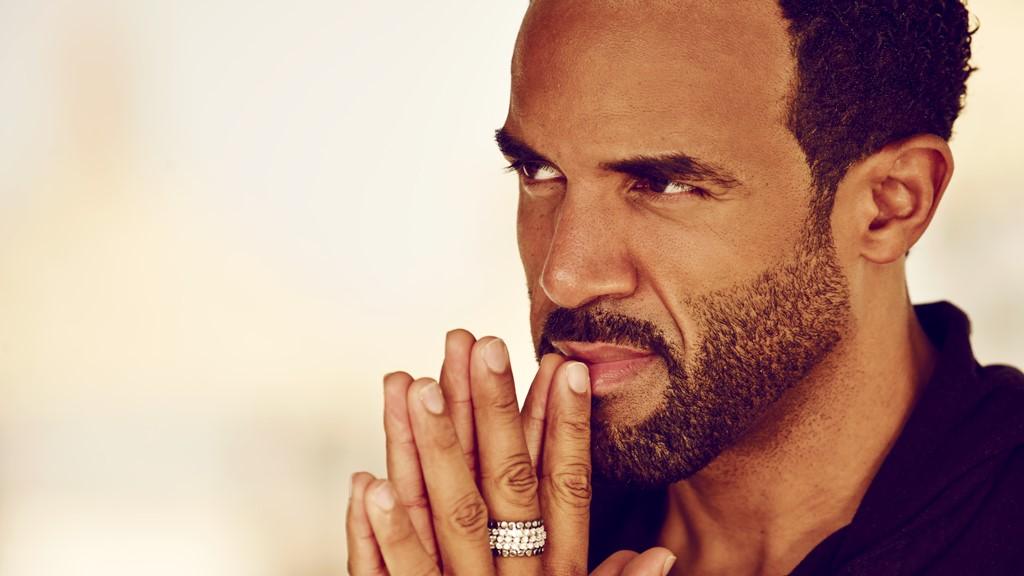Imposter Syndrome: Craig David on bullying and fame
- Published

Craig David was honoured with the Outstanding Contribution to Music Award at the MOBO Awards in 2022
Even after selling millions of records and playing to thousands of adoring fans, imposter syndrome and body image are still things that Craig David struggles with.
The singer and songwriter, from Southampton, spoke about his upbringing, music success as well as his portrayal on Channel 4 sketch show Bo' Selecta, which first aired in 2002 and was written and performed by comedian Leigh Francis.
He opens up about the challenges he has faced in the new BBC iPlayer series: Imposter Syndrome.
'You're the guilty pleasure'
The Sotonian described how he retreated to his home when people began to recognise him on the street when he first came to prominence for his music.
"It felt safe," he said, explaining: "My bedroom at home in my little two-bedroom council flat with my mum, that was a place of safety for me.
"It had my music and all my things from before [fame]."

Imposter Syndrome: Craig David
Craig David became a global music star at just 19 years old. But with the celebrity came self-doubt and unwanted attention in the form of bullying.

Describing his "warm" and "encompassing" upbringing, and the "huge influence" his father had on his music, he said he had never experienced bullying until his second year at secondary school.
"I remember one time walking down the corridor and one of the older boys, two years above me, just pushed me into the corner and asked me what money I had," he said.
"This started happening regularly, every day in that same corridor, even when teachers were coming down. They would see what was happening and he [the bully] was very quick to put an arm round, big smile - and you would just lean in because you don't want it to continue but it lodged itself as a trauma."
He said Bo' Selecta then "reinforced the same thing that I hadn't dealt with as a trauma as a kid".

David performed with Nile Rodgers at the launch event for BBC Sounds
The show ran for seven years on Channel 4 and David was one of several black celebrities mocked through racist caricature.
"The bullying was happening now on a national level," said David.
"I was experiencing that same feeling that I had when I was the kid at school."
Aged in his 20s at the time of the show, he said he felt confused and unsure how to respond: "Do we lean in? Do we pull back? Talk about the imposter syndrome. This was reinforcing that."
David said Francis was "pulling the rug from underneath" his feet and that it was "coming in the way of bullying".
The singer said he felt unable to go back to Southampton, in Hampshire, or to London where he was then living and described his discomfort when people would call his name in the street "in some funny way".

The singer opened up about the challenges he has faced in the new BBC iPlayer series: Imposter Syndrome
He explained: "You're the guilty pleasure, which is one of the reasons why I end up moving from the UK to Miami.
"It wasn't because of the lifestyle... I kind of painted it out to look that way.
"I felt that show [Bo' Selecta], in particular, was really going in, particularly on one of my favourite songs, the song that broke me, which is Re-Wind, and the culture of Re-Wind."
'Never quite right'
He also described being shocked when he looked at photographs of himself in Miami when he had lost weight.
"I look back at it in two ways," he said, explaining: "It's like, one, wow, look how far you can take it to - but also, what was the end goal?"
Feeling "it was never quite right" when he looked in the mirror, David said he believes he suffered from body dysmorphia.
He said: "I was down to like 4.5% body fat and I'm still thinking, 'if I can just get it down that… which is a very, body-building, like, lifestyle.
"But now, sitting here, I feel like I had to go back to the little kid who is carrying a bit of weight, [who was] the shoulder to cry on and be like, 'you know what, you always had everything that you could have ever had wanted'. It was never about the body."

Follow BBC South on Facebook, X, or Instagram. Send your story ideas to south.newsonline@bbc.co.uk.
Related topics
- Published15 July 2022

- Published30 December 2020
